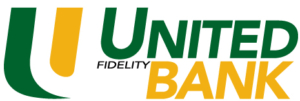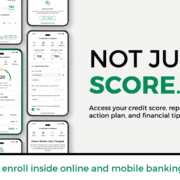Hey everyone! It’s your friendly neighborhood financial guru here, and guess what? It’s the perfect time to talk about something super important for your financial well-being: your credit score.
Now, I know “credit score” might sound a little intimidating. But trust me, it’s not as scary as it seems. Think of it like a report card for how well you manage your money, especially when it comes to borrowing. This three-digit number plays a big role in many parts of your life, from getting a loan for a car or a house to even renting an apartment.
That’s why we at United Fidelity Bank believe that understanding your credit score is a key ingredient in your recipe for financial success. And to help you on this journey, we’ve got a tool that puts you in the driver’s seat: our very own Credit Score tool, available right within your online and mobile banking!
Yep, you heard that right! No need to go searching all over the internet or pay for expensive services. If you’re a United Fidelity Bank customer, you have access to this powerful FREE resource right at your fingertips. Let’s dive into what makes our Credit Score tool so awesome and how it can help you achieve your financial dreams.
Why Should You Care About Your Credit Score?
Before we get into the nitty-gritty of the tool, let’s quickly chat about why your credit score is such a big deal. Imagine you want to buy a new car. When you apply for a car loan, the lender will look at your credit score to decide if you’re a reliable borrower. A good credit score (usually above 670) shows them you have a history of paying your bills on time and managing your debts responsibly. This can mean getting approved for the loan with better interest rates, saving you money in the long run.
It’s not just about loans, though. Landlords often check credit scores when you’re applying to rent an apartment. Utility companies might use it to determine if you need to put down a security deposit. Even some employers might peek at your credit history as part of their hiring process (though this is becoming less common and varies by location).
So, having a healthy credit score opens a lot of doors and makes your financial life much smoother. But how do you get a good score? That’s where understanding how it’s calculated comes in handy, and our Credit Score tool is here to help you with just that!
Understanding How Your Credit Score is Calculated
Ever wondered what goes into that mysterious three-digit number? Our Credit Score tool breaks it down for you! It shows you the key factors that influence your score, like:
- Payment History: 40% of your score is payment history – a snapshot of how well you’ve paid your bills on time. Consistently paying your bills on time is important.
- Credit Usage: 23% of your credit score is based on the amount of credit used out of the total credit available. Experts recommend using less than 30% of your total credit.
- Account Mix: 11% of your score is based on revolving credit (credit cards) and installment accounts (student loans, auto loans, mortgage).
- Credit Age: 21% of your score is credit age. The longer your credit history, the better.
- Inquiries: 5% of your score comes from “hard” inquiries, such as when you apply for a loan or credit card.
By showing you these factors, our Credit Score tool helps you understand what you’re doing well and what areas you might need to focus on to improve your score over time. It’s like getting a personalized roadmap to a better credit future!
More Than Just a Number
Our Credit Score tool is so much more than just a number! It’s packed with features designed to give you a complete picture of your credit health and empower you to make smart financial decisions. Let’s take a closer look at some of the things you can access:
- Personalized Credit Report: Get a detailed look at your credit history, including information about your accounts, payment history, and any negative items that might be in your report. Understanding your credit report is the first step towards taking control of your credit. Our tool makes it easy to read and understand, so you can spot any errors and address them.
- Real-Time Credit Monitoring Alerts: Life moves fast, and sometimes things happen that can affect your credit without you even realizing it. With real-time credit monitoring alerts, you’ll get notified if there are any significant changes to your credit report, such as new accounts being opened or changes in your credit balances. This helps you stay informed and quickly address any potential issues, like fraudulent activity.
- Credit Score Simulator: Ever wonder how a certain financial decision might impact your credit score? The Credit Score Simulator lets you play around with different scenarios, like paying off a chunk of debt or opening a new credit card (though be careful with that one!). This helps you understand the potential consequences of your actions before you take them, allowing you to make more informed choices that support your credit goals.
- Credit Score Education: We believe that knowledge is power! That’s why our Credit Score tool includes educational resources to help you learn more about credit scores, how they work, and what you can do to improve yours. You’ll find helpful articles, tips, and explanations right within the tool, making it easy to boost your financial knowledge.
- Set Credit Goals: Do you have big financial dreams? Maybe you’re saving up for a down payment on a house, or perhaps you want to qualify for a better interest rate on a future loan. Our Credit Score tool can help you get there with its personalized Credit Goals feature!
- This is tricky because we don’t own the tool – may be best to remove this statement. Sorry I didn’t mention that the 1st time.
The Best Part? It’s Absolutely FREE!
Yes, you read that correctly! Our Credit Score tool is absolutely FREE for all United Fidelity Bank customers. You can check and refresh your credit score and credit report daily without impacting your score at all. That’s right, checking your credit score with our tool won’t hurt it! So, there’s really no reason not to take advantage of this valuable resource.
Think about it – you get access to your credit score, personalized reports, real-time monitoring, a simulator, and educational resources, all for free, right within your online and mobile banking. It’s like having a personal credit advisor available 24/7!
Your Partner in Financial Wellness
At United Fidelity Bank, we’re more than just a bank – we’re your financial partner. We understand that navigating the world of finance can sometimes feel overwhelming, and we’re here to provide you with the tools and resources you need to succeed. Our Credit Score tool is just one of the ways we’re working to help you build a brighter financial future.
By offering this free and comprehensive tool, we hope to empower you to take control of your credit, understand your financial health, and achieve your goals. We believe that when you’re financially confident, you’re better equipped to handle whatever life throws your way and pursue your dreams with greater peace of mind.
What are you waiting for?
It’s time to unlock the power of our Credit Score tool and start taking control of your financial future!
Here’s how to get started:
- Log in to your United Fidelity Bank Online Banking account. You can do this through our website or our mobile app.
- Look for the “Credit Score” tool. It’s located on the main menu or dashboard.
- Enroll in the tool. It’s a quick and easy process.
- Start exploring! Check your score, review your report, set some goals, and dive into educational resources.
It’s that simple! Enroll in our Credit Score tool today to better understand your credit and work toward a brighter financial future. We’re here to support you every step of the way.


















